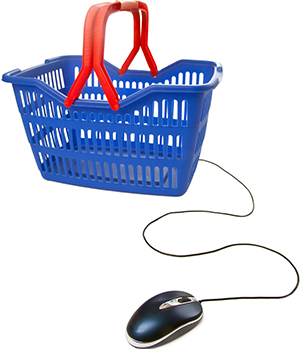The Cybersecurity and Infrastructure Security
There’s every reason in the world to shop online. The bargains are there. The selection is

- Use familiar websites
Start with a trusted site. Search results can be rigged to lead you astray, especially when you drift past the first few pages of links. If you know the site, chances are it’s less likely to bea rip-off.
Beware of misspellings or sites using a differenttop-level domain (.net instead of .com, for example)—those are the oldest tricks in the book. Yes, sales on these sites might look enticing, but that’s how they trick you into giving upyour info. - Look for the lock
Never ever, ever buy anything online using your credit card from a site that doesn’t have secure socketslayer (SSL) encryption installed. You’ll know if the site has SSL because the URL for the site will start with HTTPS—instead of just HTTP. An icon of a lockedpadlock (🔒) will appear, typically to the left of the URL in the address bar or the status bar down below; it depends onyour browser.
HTTPS is pretty standard now even onnon-shopping sites, enough thatGoogle Chrome flags any page without the extra S as “not secure.” So, a site without it should stand outeven more. - Don’t overshare
No online shoppinge-tailer needs yourSocial Security number or your birthday to do business. However, if crooks get them and yourcredit card number, they can do a lot of damage. The more scammers know, the easier it is to steal your identity. When possible, default to giving up as little personal data as possible. Even major sitesget breached. - Check statements regularly
Don’t wait for your bill to come at the end of the month. Go online regularly during the holiday season and look at electronic statements for yourcredit card, debit card, and checking accounts. Look for any fraudulent charges, even originating from payment sites like PayPal and Venmo. (After all, there’s more than one way to get toyour money.) - Pay with a Credit Card
You’ll usually get the best liability protection—online and offline—when you use acredit card. Here’s why. If someone racks up unauthorized charges on yourcredit card, federal regulations say you won’t have to pay while the card company investigates. Most majorcredit cards offer $0 liability forfraudulent purchases.
Keep in mind, your liability for unauthorized charges on your debit card is capped at $50, if you report it withintwo business days. But if someone uses your account and you don't report the theft, after60 days you may not be reimbursedat all.
You can also try a virtualcredit card. Some banks offer this nifty tool that acts like an online version of your card. With a virtualcredit card, the issuer will randomly generate a number that’s linked to your account, and you can use it anywhere online and choose when the number expires. It might be best to generate a new number every time you buy something online, or when you shop with a new retailer. Anyone who tries to use that number will be outof luck. - Beware of
shopping-related phishing schemes
Phishing is an incredibly effective tactic used by cybercriminals that involves sending emails designed to look like they’re from someone else—like a brand you love. Generally speaking, these emails will encourage you to click on a malicious link by enticing you with a deal or exclusive price. If you click on the link, you’re redirected to a spoofed landing page of the brand they’re impersonating. Typically, the cybercriminal will try to collect login credentials or payment information like yourcredit card number. If something smells phishy, you can check the “from” email address to ensure it’s legitimate, and we also recommend hovering your mouse over the URL before you click to confirm that it leads to a legitimate site and nota fake. - Avoid public Wi-Fi
You might be tempted to take your shopping spree to a coffee shop for a cup of joe. Keep in mind,Wi-Fi networks use public airwaves. With a little techknow-how and the freely availableWi-Fi password at your favorite cafe, someone can intercept the data you send and receive while onfree public Wi-Fi. Shopping online usually means giving out information that an identity thief would love to grab, including your name andcredit card information. Bottom line: It’s never a good idea to shop online or log in to any website while you’re connected topublic Wi-Fi. - Use a VPN
Still can’t resist the lure of shopping online while sipping that peppermint latte? If you must shop online onpublic Wi-Fi, consider installing and using a virtual privatenetwork (VPN) — on all mobile devices and computers before connecting to anyWi-Fi network. A VPN creates an encrypted connection between your smartphones and computers and the VPN server. Think of it as a secure tunnel your Internet traffic travels through while you browse the web, making your data safer from interception bynearby hackers. - Create strong passwords
We will again beat this dead horse about making sure that you utilize uncrackable passwords. It’s never more important than when banking and shopping online. Our tips for creating a unique password can come in handy during a time of year when shopping around probably means creating new accounts on all sorts ofe-commerce sites.
But even your perfect password isn’t perfect. The smarter move: use apassword manager to create uncrackable passwords for you. It’ll also keep track of them and enter them, so you don’t have to thinkabout it. - Update your browser
Each new version of your Internet browser, especially if you use one of the more popular browsers, gets a boost in security. Older browsers, besides not working as well with some websites, often have holes in their security that hackers have discovered and can exploit. The same goes for your operating system andanti-virus software. Updates will keep you ahead ofwould-be identity thieves and keep yourcredit safe. - Don’t save sensitive info on sites or in your browser
This is more of a general safety tip, but it’s more common during the holiday season to save personal and payment information on shopping websites so you don’t need to fill it in the next time you buy something there. However, these sites aren’t designed to provide the necessary security for your data—they’re designed for shopping. That’s why we routinely hear about hacks and breaches containing personal information from retailers. If you want to have the convenience ofauto-filling your information on different sites without sacrificing the security of your data, you should try apassword manager, which gives you automatic logins and secure autofill of personal andpayment information. - Ship to a secure location
This may seem extreme, but package theft has become more prevalent in recent years with the rise of online shopping and the barrage of home deliveries. If no one’s home during the day, consider shipping to your office or somewhere else that keeps your packages off sidewalks orfront doorsteps. - Skip the card, use the phone
Paying for items using your smartphone is pretty standard these days inbrick-and-mortar stores, and is actually even more secure than using yourcredit card. Using a mobile payment app likeApple Pay generates aone-use authentication code for the purchase that no one else could ever steal and use. Plus, you’re avoiding card skimmers—you don’t even need to take yourcredit card with you if you only go places that accept phone payments. How does that matter if you’re online shopping? Manye-tailers will now accept payment usingApple Pay andGoogle Pay. - Count the cards
Gift cards are the most requested holiday gift every year, and this year will be no exception. Stick to the source when you buy one; scammers like to auction off gift cards on sites like eBay with little or no funds on them. Plus, there are many gift card “exchanges” out there that are a great idea—letting you trade away cards you don’t want for the cards that you do—but you can’t trust everyone else using such a service. You might get the card and find it’s already been used. Make sure the site you’re using has arock-solid andclear-as-crystal guarantee policy in place. Better yet, just go directly to a retailbrick-and-mortar store to get thephysical card. - Check the seller
Did you find the perfect gift on an unfamiliar website? Break out your detective skills whenever you want to buy something from a new merchant. The Better Business Bureau has an online directory and a scam tracker. Put companies through the wringer before you plunk down yourcredit card number. There’s a reason thatnon-delivery/non-payment is the most common cybercrime complaint these days—it hurts when that happens, financiallyand emotionally.
That said—online reviews can also be gamed. If you see nothing but positive feedback and can’t tell if the writers are legitimate customers, followyour instincts.
If nothing else, make absolutely sure you’ve got a concrete address and a workingphone number for the seller. If things go bad, you have a place to take your complaint. In fact, call them before you order so you can clarify a return policy and where to go with any issues afterthe purchase. - Complain loud and proud
Don’t be embarrassed if you get taken for a ride while online shopping. Instead, get very, very proactive. Complain to the seller. If you don’t get satisfaction, report it to the Federal Trade Commission, your state’s attorney general, even the FBI. That’s probably going to work best if you buy in the US, rather than withforeign sites.

A stolen identity is even worse than a lump of coal in your stocking. Make sure you have only nice surprises this holiday season by sticking to these smart online shopping tips to keep you and your

